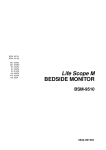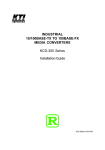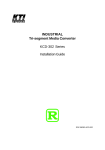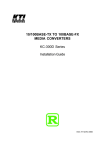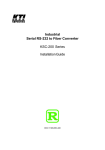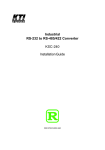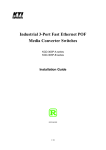Download KTI Networks KCD-400 Series Network Card User Manual
Transcript
INDUSTRIAL 1000BASE-T TO 1000BASE-X MEDIA CONVERTERS KCD-400 Series Installation Guide DOC.060227-KCD-400 -1- (C) 2005 KTI Networks Inc. All rights reserved. No part of this documentation may be reproduced in any form or by any means or used to make any directive work (such as translation or transformation) without permission from KTI Networks Inc. KTI Networks Inc. reserves the right to revise this documentation and to make changes in content from time to time without obligation on the part of KTI Networks Inc. to provide notification of such revision or change. For more information, contact: United States International KTI Networks Inc. P.O. BOX 631008 Houston, Texas 77263-1008 Phone: Fax: E-mail: URL: 713-2663891 713-2663893 [email protected] http://www.ktinet.com/ Fax: E-mail: URL: 886-2-26983873 [email protected] http://www.ktinet.com.tw/ -2- The information contained in this document is subject to change without prior notice. Copyright (C) All Rights Reserved. TRADEMARKS Ethernet is a registered trademark of Xerox Corp. FCC NOTICE This device complies with Class B Part 15 the FCC Rules. Operation is subject to the following two conditions: (1) This device may not cause harmful interference, and (2) this device must accept any interference received including the interference that may cause. CE NOTICE Marking by the symbol indicates compliance of this equipment to the EMC directive of the European Community. Such marking is indicative that this equipment meets or exceeds the following technical standards: EMC Class B EN 50081-1/1992 : EN55022:1994/A1:1995/A2:1997 Class B EN61000-3-2:2000 EN61000-3-3:1995/A1:2001 EN 55024:1998/A1:2001 IEC 61000-4-2:1995 IEC 61000-4-3:1995 IEC 61000-4-4:1995 IEC 61000-4-5:1995 IEC 61000-4-6:1996 IEC 61000-4-8:1993 IEC 61000-4-11:1994 -3- Table of Contents 1. Introduction ......................................................... 5 1.1 Features ........................................................................................ 6 1.2 Specifications ................................................................................ 7 1.3 Special Functions ......................................................................... 11 2. Installation ......................................................... 13 2.1 2.2 2.3 2.4 2.5 2.6 2.7 2.8 Unpacking ................................................................................... Safety Cautions .......................................................................... DIN-Rail Mounting ....................................................................... Panel Mounting ............................................................................ Applying Power ........................................................................... Power Failure Relay Output ........................................................ Making Twisted Pair Copper Port Connection ............................ Making Fiber Port Connection ..................................................... 13 14 15 17 19 22 23 24 3 LED Indicators ................................................... 25 3.1 LED Indicators ............................................................................. 25 Appendix: Model Optical Specifications ............ 26 -4- 1. Introduction The industrial 1000BASE-T to 1000BASE-X media converter series provides industrial strength Ethernet copper-to-fiber media conversion, allowing for 1000Base-T-to-1000Base-X over multi-mode or optional singlemode fiber optical media. For industrial environment, the converters are designed with the following enhanced features exceeding that of commercial media converters: • High and wide operating Temperature • Wide operating voltage range for DC power input • Power input interface: Industrial screw terminal block and DC power jack for external commercial power adapter as option • DIN rail mounting support for industrial enclosure • Screw panel mounting support for industrial enclosure • Industrial-rated Emission and Immunity performance -5- 1.1 Features • • • • • • • • • • • • • • • • • • Gigabit copper to fiber conversion: 1000Base-T-to-1000Base-SX/LX over multimode or single-mode fiber SFP design : For flexibility, an SFP (Mini-GBIC) connector is provided for the fiber port to accommodate any type of SFP fiber transceiver when needed. Support full wire speed copper to fiber conversion Auto MDI/MDI-X detection function on the copper port Auto-negotiation support Plug and play : no configuration settings is required Link Fault Pass Through : this function allows link fault status passes through between copper link and fiber link transparently. Far End Fault function on fiber port Transparent conversion to any type of packet frame No packet length limitation Diversified mounting support : desktop mounting, wall mounting, optional Din-Rail support Low power consumption Two power interface type: screw terminal block and DC jack Wide operating voltage input range : +7 ~ 30VDC Support DIN rail mounting Support panel mounting High and wide operating temperature range : -20oC to 70oC Industrial-rated Emission and Immunity performance -6- 1.2 Specifications This figure shows the important components of the converter: -7- Twisted-Pair Interface (Copper Port) Connector Shielded RJ-45 Signal Compliance IEEE 802.3ab 1000BASE-T std. Pin Assignments Auto MDI/MDI-X detection Data Speed 1000Mbps Duplex Mode Half-duplex or Full-duplex Configuration Auto-negotiation support Cable Types Category 5 or higher UTP Link Distance Up to 100 meters Fiber Optic Interface (Fiber Port) Signal Compliance IEEE 802.3z 1000BASE-SX/LX std. Connector SFP for pluggable fiber transceiver Data Speed 1000Mbps Duplex Mode Full duplex Cable Types MMF - 50/125, 62.5/125 SMF - 9/125 Link Distance MMF up to 500m SMF -model dependent Eye Safety compliance IEC825 Class 1 Refer to Appendix for detailed optical specifications. LED Indicators LED DISPLAY PWR Power status SFP SFP slot status LINK Link status OL Optical status STATE ON OFF ON OFF ON OFF BLINK ON OFF INTERPRETATION Power on Power off SFP transceiver is installed. No SFP transceiver is installed. Copper-fiber link up Copper-fiber link down Copper-fiber link with data traffic Fiber port optical signal detected Fiber port no optical signal -8- DC Power Interface Interface Operating Input Voltages Power consumption Basic Information Conversion Screw-type terminal block 1. Two pairs for power wire cascading 2. One pair for power failure relay output DC Jack (-D6.3mm/+D2.0mm) +7V ~ +30V(+5%) 2.25W @+7.5VDC input 2.3W @+24VDC input 2.5W @+30VDC input Packet Length Full wire speed 1000Mbps - 1,488,00pps at 64-byte packets Transparent and no modification for - IEEE 802.3 standard packets - IEEE 802.1Q VLAN tagged packets No limit Mechanical Dimension (base) Housing Mounting Support Weight W 28mm x D 82mm x H 95mm Enclosed metal with no fan DIN-rail mounting, Panel mounting 252g Environmental Operating Temperature Storage Temperature Relative Humidity Typical -20oC ~ 70oC (model dependent) -20oC ~ 85oC 5% ~ 90% Packet Types -9- Certificate FCC CE/EMC CE/LVD Safety Part 15 Class B EMI EN50081-1 Class B EMS EN55024 EN 60950 EN 50081-1/1992 : EN55022:1994/A1:1995/A2:1997 EN61000-3-2:2000 EN61000-3-3:1995/A1:2001 EN 55024:1998/A1:2001 IEC 61000-4-2:1995 ESD Test IEC 61000-4-3:1995 RS Test IEC 61000-4-4:1995 EFT/BURST Test IEC 61000-4-5:1995 Surge Test IEC 61000-4-6:1996 CS Test IEC 61000-4-8:1993 Magnetic Field IEC 61000-4-11:1994 Volatge Int. Dips -10- 1.3 Special Functions Auto MDI/MDI-X Function This function allows the copper port to auto-detect the twisted-pair signals and adapts itself to form a valid MDI to MDI-X connection with the remote connected device automatically. Link Fault Pass Through Function When a link fault is detected on the copper port, the device will force a link down on the fiber port immediately. Similarly, a link fault detected on the fiber port will also force a link down on the copper port. As illustrated in the following figure, this function allows to pass copper link fault to the remote link partner and makes the converter like a twisted pair cable extender. -11- Far End Fault Function The fiber port is facilitated with this function. When the fiber port detects a link failure on its receiving circuitry, it will send out an FEFI (Far End Fault Indication) signal to the remote connected device to indicate a remote fault is detected. It also is capable to receive FEFI signal sent from the remote link partner if the link partner detected a receiving fault. Upon receiving an FEFI signal, it indicates a link failure occurred on the transmitting path. This function allows the converter to report a fiber link fault even when a link failure occurred on transmitting fiber cable. -12- 2. Installation 2.1 Unpacking Check that the following components have been included: • Information CD • The Media Converter unit • DIN-rail mounting bracket If any item is found missing or damaged, please contact your local reseller for replacement. The following are available optional accessories: • Panel Mounting Bracket • The bracket is used for mounting the converter on a panel surface. Commercial-rated AC power adapters: - Rated AC120V/60Hz DC7.5V 1A - Rated AC230V/50Hz DC7.5V 1A - Rated AC100V/50-60Hz DC7.5V 1A - Rated AC240V/50Hz DC7.5V 1A The adapters are used for supplying DC power to the converter via DC power jack interface. -13- 2.2 Safety Cautions To reduce the risk of bodily injury, electrical shock, fire, and damage to the equipment, observe the following precautions. • Do not service any product except as explained in your system documentation. • Opening or removing covers may expose you to electrical shock. Only a trained service technician should service components inside these compartments. • If any of the following conditions occur, unplug the product from the electrical outlet and replace the part or contact your trained service provider: - The power cable, extension cable, or plug is damaged. - An object has fallen into the product. - The product has been exposed to water. - The product has been dropped or damaged. - The product does not operate correctly when you follow the operating instructions. • Do not push any objects into the openings of your system. Doing so can cause fire or electric shock by shorting out interior components. • Operate the product only from the type of external power source indicated on the electrical ratings label. If you are not sure of the type of power source required, consult your service provider or local power company. -14- 2.3 DIN-Rail Mounting In the product package, a DIN-rail bracket is installed on the device for mounting the converter in a industrial DIN-rail enclosure. The steps to mount the device onto a DIN rail are: 1. Install the mounting bracket onto the device unit as shown below: 2. Attach bracket to the lower edge of the DIN rail and push the unit upward a little bit until the bracket can clamp on the upper edge of the DIN rail. 3. Clamp the unit to the DIN rail and make sure it is mounted securely. 4. Make sure that there are proper heat dissipation from and adequate ventilation around the device. -15- The final mechanical dimensions after installing DIN rail mounting bracket are: -16- 2.4 Panel Mounting The device is provided with an optional panel mounting bracket. The bracket support mounting the device on a plane surface securely. The mounting steps are: 1. Install the mounting bracket on the device unit. 2. Screw the bracket on the device unit. 3. Screw the device unit on a panel. 4. Make sure that there are proper heat dissipation from and adequate ventilation around the device. Do not place heavy objects on the device. -17- The screw locations and final dimension are shown below: -18- 2.5 Applying Power The power specifications of the device are: Operating Voltage +7 ~ +30VDC Power Consumption Max. 2.5W @30VDC The device provides two types of power interfaces, terminal block and DC power jack for receiving DC power input from external power supply. Using Terminal Blocks Either DC1 interface or DC2 interface can be used to receive DC power from an external power system. Or, DC2 also can be used to deliver the power received on DC1 to next device in cascading way. DC1 + Vdc Positive (+) terminal DC1 - Vdc Negative (-) terminal DC2 + Vdc Positive (+) terminal DC2 - Vdc Negative (-) terminal Three 2P terminal plugs are provided together with the device. Two of the three plugs are used for DC1 and DC2 interfaces respectively. The plug is shown below: -19- Power wires: 24 ~ 12AWG (IEC 0.5~2.5mm2) Install the power source wires with the plug properly. Screw the wire with plug securely. Then, plug in DC1 contacts. If cascading the power to next device is needed, install the power wires and plug for another switch. Then, use DC2 contacts. Note: Only up to four device units can be cascaded to receive power from one main power input source. -20- Using DC Power Jack DC Jack Connector: Jack D 6.3mm D 2.0mm AC Power Adapters: Optional commercial rated adapters are available for purchasing. Rated AC120V/60Hz DC7.5V 1A Rated AC230V/50Hz DC7.5V 1A Rated AC100V/50-60Hz DC7.5V 1A Rated AC240V/50Hz DC7.5V 1A Connect power adapter DC plug to the DC power jack of the converter before connecting to the AC outlet. Connect the power adapter to the AC outlet. Note: Before you begin the installation, check the AC voltage of your area. The AC power adapter which is used to supply the DC power for the unit should have the AC voltage matching the commercial power voltage in your area. -21- 2.6 Power Failure Relay Output The device provides a relay output to report power failure event to a remote alarm monitoring system. The replay output is provided with two contacts labeled PF+ and PF- in the terminal block interface. Use the provided 2P terminal plug for signal wiring and plug into the PF+/ - contacts. The function is designed as : Power is normal PF+ contact is shorted with PF- contact. Power failure PF+ contact is disconnected with PF- contact. Note: Be sure the voltage applied on PF+/- contacts is within the specification of 30VDC/1A max. or 120VAC/0.5A max. -22- 2.7 Making Twisted Pair Copper Port Connection Copper port is featured to support connection to : • Auto-negotiation devices • Auto-negotiation incapable 10BASE-T devices • Auto-negotiation incapable 100BASE-TX devices Network Cables 1000BASE-T: 4-pair UTP Cat. 5e or 6, EIA/TIA-568B 100-ohm STP Link distance: Up to 100 meters Note: The copper port is featured with auto MDI/MDI-X crossover detection and configuration function. No matter a straight through cable or crossover cable is connected, the copper port can sense the receiving pair automatically and configure itself to match the connection. -23- 2.8 Making Fiber Port Connection The mini-GBIC (SFP) port must be installed with an SFP fiber transceiver for making fiber connection. The device may come with an SFP transceiver pre-installed when it is shipped from factory. Installing SFP Fiber Transceiver Turn off the power to the device. Insert the SFP fiber transceiver into the mini-GBIC port. Normally, a bail is provided for every SFP transceiver. Hold the bail and make insertion. Until the SFP transceiver is seated securely in the slot, place the bail in lock position. Connecting Fiber Cables LC connectors are commonly equipped on most SFP transceiver modules. Identify TX and RX connector before making cable connection. The following figure illustrates a connection example between two fiber ports: Make sure the RX-to-TX connection rule is followed on the both ends of the fiber cable. Note: For Bi-Di (Bidirectional) SFP transceivers which use two different wavelengths for TX and RX respectively over single fiber cable, only one connector is provided on the fiber port and only one fiber cable is used. Network Cables Multimode (MMF) - 50/125, 62.5/125 Single mode (SMF) - 9/125 -24- 3 LED Indicators The following figure shows the locations of the configuration switches and LED indicators: 3.1 LED Indicators LED DISPLAY PWR Power status STATE ON OFF INTERPRETATION The device is powered on. The device is powered off. SFP ON OFF An SFP transceiver is installed. No SFP transceiver is installed. LINK Link status ON OFF BLINK Copper-fiber link up Copper-fiber link down Copper-fiber link with data traffic OL ON OFF Fiber port optical signal detected Fiber port no optical signal SFP slot status Optical status -25- Appendix: Model Optical Specifications The media converter series provides the following fiber options: Model Specifications KCD-400-xx FX Reference Fiber Distance Wavelength Operating Temperature -SX LC 850nm 50/125 MMF 500m -20 ~ 70oC 62.5/125 MMF 200m -LX LC 1310nm MMF 550m SMF 10km -20 ~ 70oC -LX20 LC 1310nm SMF 20km -20 ~ 70oC Optical Specifications KCD-400-xxx FX Tx Power Sensitivity -SX LC -9.5 ~ -4 dBm -18dBm Max. Rx Power -1 dBm -LX LC -9.5 ~ -3 dBm -20dBm -3 dBm -LX20 LC -7 ~ 0 dBm -24dBm -3 dBm -26-


























